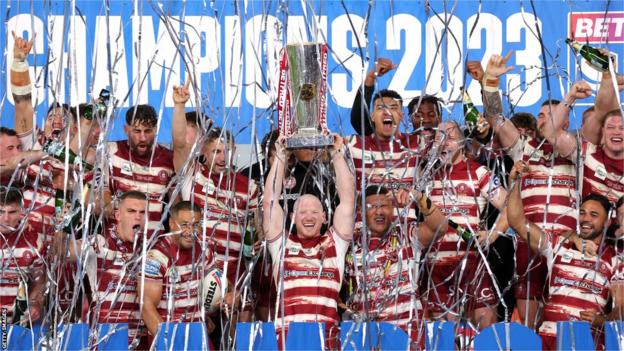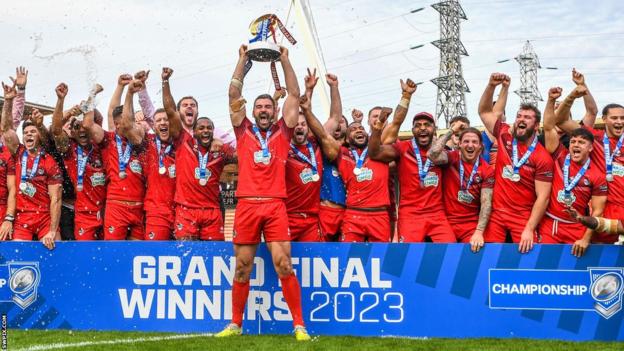[ad_1]

It is the biggest transformation of rugby league for a generation – and not without its critics.
Earlier in October, under Rugby League Commercial’s ‘Reimagining Rugby League’ initiative, media giant IMG awarded clubs in Super League, the Championship and League One a grading.
This grading saw teams awarded points for on and off-field performance, with the aim of deciding who will make up the top tier in 2025 and beyond.
Speaking to BBC Sport, Rugby Football League (RFL) chief executive Tony Sutton talked about his hopes for a “new phase” for rugby league in the northern hemisphere amid criticism of the process by some of the body’s member clubs.
‘We’re in the entertainment business’

The grading announced on 25 October split member clubs into three grades – A, B and C – with seven being awarded the highest Grade A status.
Clubs were awarded points, and their grade, based on five categories – fandom, performance, finances, stadium and community – with a maximum 20 points on offer.
The seven clubs to earn Grade A status were reigning champions Wigan Warriors along with Leeds Rhinos, St Helens, Catalans Dragons, Warrington Wolves, Hull FC and Hull KR.
London Broncos, promoted to the top flight 10 days before the gradings were announced, are 24th in the new gradings and likely to spend only one season in Super League before the change is introduced in time for 2025.
The gradings announced will be reviewed midway through 2024, however, when final assessments will be implemented for the following season.
Asked whether the changes were a revolution, Sutton said: “It’s definitely a new phase for the sport. It’s really aimed at trying to grow standards across clubs and across venues and finances.
“What IMG looked at when they set the model up originally was what their view of a successful club is. Therefore the scoring criteria is graded on people being able to achieve that.
“It’s about standards. We’re in the entertainment business.”
‘We need to learn from the process’
The grading announcement received criticism from some clubs, including Super League side Castleford, who were ranked 13th.
The Tigers said they were unhappy with their position, having been docked half a point erroneously for submitting incorrect financial data, with managing director Mark Grattan adding he was “extremely disappointed” with the RFL’s decision.
In response, the RFL said it would “review and consider” Castleford’s case – “particularly given the tight scoring margins around the 12th position in the rankings”.
Featherstone Rovers, who voted against the proposals earlier this year and were ranked 15th out of 36 clubs, were also critical.
“We are concerned that we are yet to have any direct dialogue or visit from IMG despite being one of the leading Championship clubs for the past decade,” Rovers said.
Sutton stressed the grading announcement was not final, and that everyone involved in the process needs to take on board what they have learned up to this point.
“What we aimed to do with this illustrative year was to allow people to get used to it, as well as ourselves, and we could learn a lot from the process – but also the timing of how and when we do things,” Sutton continued.
“As we should do with any big project we undertake, we need to learn from it, and the review is already under way. We’ll report that back to our council in December and talk about how we do it next year when it’s for real.”
‘London recognise what they need to do’

One of the biggest surprises of the grading announcement was London Broncos’ lowly rating of 24th. However, the club have committed to improve on their score as they prepare for the upcoming 2024 Super League season.
London caused an upset when they beat Toulouse in the south of France in the 2023 Championship Grand Final to return to the top flight.
When the grading announcement was made, Toulouse were ranked 10th, meaning they are likely to make a Super League return themselves in 2025.
“What was really interesting to see was London’s statement. They recognised what they felt they needed to do,” Sutton added.
“But the outline and the story and criteria shows what a club needs to do under this framework, and I thought London engaged with that fantastically after that match a couple of weeks ago.”
Twelve teams will contest next year’s Super League season, but in the future, should the grading system pay dividends, the RFL will consider it a success if more clubs are in a similar position to those in the top flight.
“The beauty of this [model] is that you can look at a one-year, two-year, even a five or 10-year plan, see where those points are, see where the system or model says this is a good area to progress in, and almost put in the resource to be able to do that,” Sutton said.
“The power of this is that a club such as Cornwall or Midlands Hurricanes can look at that and say, ‘This is where we want to go in two, five or 10 years and this is how we can progress.’
“If we’re getting to the point where there are 12, 15 or 20 Grade A clubs, then what we’ve put in place has absolutely worked.
“Then we might have a different question to ask ourselves, but at that point the system we’ve just started has absolutely done its job.”






